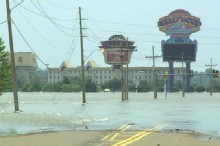River crests in Memphis; states downstream prepare

VICKSBURG, Miss. – The Mississippi crest rolled past Memphis on Tuesday, going easy on much of the city, yet downriver in the mostly poor, fertile Delta region, floodwaters washed away crops, damaged hundreds of homes and closed casinos key to the state's economy.
In Vicksburg, home of a pivotal Civil War battle, the river was forecast to peak slightly above the record level set during the flood of 1927. Some places were already several feet underwater and the river wasn't expected to peak here until Saturday.
Wearing rubber boots and watching fish swim up and down his street, William Jefferson stood on a high spot in his neighborhood. He said hasn't had a hot meal since water started coming into his house a few days ago.
Now, it's inundated with at least three feet water, as are dozens of other homes in the neighborhood. Nearby, his brother Milton cast a fishing rod.
"At least we can catch something fresh to eat, because we ain't got no icebox or electricity," he said with a smile. Then the pair playfully debated about whether they would actually eat anything caught in the filthy floodwaters.
"If you eat a fish right now, you won't live to see the water go down," William Jefferson said.
Nearly 600 households had suffered water damage, some more extensive than others, said Greg Flynn, a spokesman for the state emergency management agency. The residences ranged from run-down farmhouses to modest, one-story homes.
Flynn wasn't sure how many people had evacuated, but he was surprised at the low number of people staying at shelters. In Warren County, where Vicksburg is located, residents walked through town on an elevated railroad track with water several-feet deep on both sides, yet no one was staying in a shelter. To the north, in Tunica County, 24 people slept in a shelter on Monday night, Flynn said.
Others formed a makeshift community of borrowed or quickly bought recreational vehicles.
Jimmy Mitchell, 46, and his wife and two children have been living in a loaned camper for more than week at the Paul Battle Arena and Exposition Center.
"There's no sewage hook-up. You go in a barn to take a shower," said Mitchell, who is from the small community of Cutoff. "We have no time frame on how long we can stay."
As Mitchell and friends sat outside chatting in the breeze, children rode bikes nearby.
"Cutoff is a community where everybody lives from paycheck to paycheck. It's also a community where everybody sticks together," Mitchell said.
Widespread flooding is expected along the Yazoo River, a tributary that joins the Mississippi and is backed up because of the bulging Mississippi. Farmers built homemade levees in an attempt to protect their corn, cotton, wheat and soybean crops, but many believed the crops would be lost entirely.
The Mississippi crested in Memphis at nearly 48 feet on Tuesday, falling short of its all-time record but still soaking low-lying areas with enough water to require a massive cleanup. Homes had polluted floodwater near the top of the first floor in some areas, others were completely submerged.
Snakes and other creatures infested the foul-waters, and officials warned of unseen bacteria.
The crest was of little consolation for many.
"It doesn't matter. We've already lost everything," said Rocio Rodriguez, 24, who has been at a shelter for 12 days with her husband and two young children since their trailer park flooded.
Nearly 500 people in Memphis were still in shelters, though the city's cherished music landmarks, from Sun Studio to Beale Street to Graceland came out unscathed.
The Memphis crest is below the record of 48.7 feet recorded during a devastating 1937 flood.
Shelby County and four others were declared disaster areas by President Barack Obama, which means that they'll be eligible for much-needed federal disaster aid.
The slow-moving disaster was headed downstream over the next couple of weeks.
The Vicksburg National Military Park, where thousands of Civil War soldiers died and are buried after a battle in 1863, was expected to remain dry. The park is the site where Maj. Gen. Ulysses S. Grant's troops entrapped a Confederate army under Lt. Gen. John Pemberton, forcing them to surrender. It was key victory along the stronghold on the Mississippi River, and effectively split the Confederacy in half.
The state's key gambling industry was taking a hit, too. All of the 19 casinos along the river were to be shuttered entirely by the end of the week, costing governments about $12 million to $13 million in taxes per month. That tally doesn't count local sales taxes charged on such services as the 6,700-plus casino hotel rooms and the temporary loss of income for 13,000 employees, said Allen Godfrey, deputy director of the Mississippi Gaming Commission.
In Carter, Miss., about 35 miles east of the Mississippi, Scott Haynes, 46, estimated he would spend more than $80,000 on contractors to build levees around his house and grain silos, which hold 200,000 bushels of rice that he can't get out before the water comes. Heavy equipment has been mowing down his wheat fields to get to the dirt that is being used to build the levees, and he expected nearly all of his farmland to flood.
"That wheat is going to be gone, anyway," he said. "We don't know if we're doing the right thing or not, but we can't not do it."
On the downtown Memphis riverfront, people came out to gaze into the river. By Tuesday morning, high-water marks were visible on concrete posts, indicating that water levels had decreased slightly.
"It could have been a lot worse. Levees could have broke," said Memphis resident Janice Harbin, 32. "I'm very fortunate to stand out here and see it — and not be a victim of the flood."
Because of heavy rain over the past few weeks and snowmelt along the upper reaches of the Mississippi, the river has broken high-water records upstream and inundated low-lying towns and farmland. The water on the Mississippi is so high that the rivers and creeks that feed into it are backed up, and that has accounted for some of the worst of the flooding so far.
Because of the levees and other defenses built since the cataclysmic Great Flood of 1927 that killed hundreds of people, engineers say it is unlikely any major metropolitan areas will be inundated as the high water pushes downstream over the next week or so. Nonetheless, they are cautious because of the risk of levee failures, as shown during Hurricane Katrina in 2005.
In Louisiana, the Corps partially opened a spillway that diverts the Mississippi into a lake to ease pressure on the levees in greater New Orleans. As workers used cranes to remove some of the Bonnet Carre Spillway's wooden barriers, hundreds of people watched from the riverbank.
The spillway, which the Corps built about 30 miles upriver from New Orleans in response to the flood of 1927, was last opened in 2008. Monday marked the 10th time it has been opened since the structure was completed in 1931.
The Corps has also asked for permission to open a spillway north of Baton Rouge for the first time since 1973. Officials warned residents that even if it is opened, they can expect water 5 to 25 feet deep over parts of seven parishes. Some of Louisiana's most valuable farmland is expected to be inundated.
___
Associated Press writers Randall Dickerson in Nashville, Tenn., Michael Kunzelman in Norco, La.; Mary Foster in Angola, La.; Jim Salter in St. Louis and Chuck Bartels in Little Rock contributed to this report. AP video journalist Jason Bronis contributed from Memphis.
http://news.yahoo.com/s/ap/20110510/ap_on_re_us/us_mississippi_river_flooding




Tidak ada komentar:
Posting Komentar